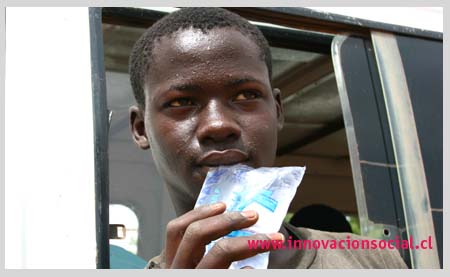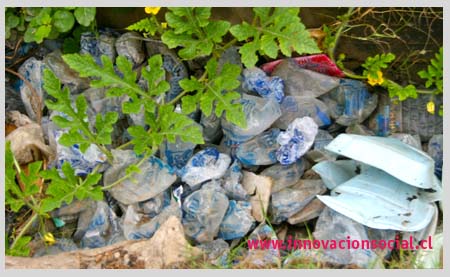Global Mamas, re-using for change [Ghana]
August 23, 2010 at 2:25 pm 4 comments
 Photo: Mali, frontier with Burkina Faso [CMiranda]
Photo: Mali, frontier with Burkina Faso [CMiranda]  Pencil Case made of re-used water sachets [CM]
Pencil Case made of re-used water sachets [CM]
Not long ago, one of the professors at NC State, working in the Ghana abroad program had mentioned the existence of the organization: “Global Mamas”. I was pretty pleased, as I arrived in Accra, to verify the great work they are doing. One of the product lines that caught my attention were the recycled ones categorized under “trashy bags”. There is even a particular NGO just dedicated to this area. These women are not just manufacturing products with reused materials [remember there is a big difference between recycle and re-use. Re-using is even better than recycling as it requires no energy to turn mater into another form], but creating a whole selling experience out of it [not to speak about the benefits of small and successful entrepreneurship].
They reuse, mainly, plastic bags coming from the consumption of the lovely Fan Milk products [ice cream packaged in a cheap Polypropylene bag] and purified water sachets. Photo: Trash in drains, Cape Coast, Ghana [CMiranda]
Photo: Trash in drains, Cape Coast, Ghana [CMiranda]
Both of this Bottom of the Pyramid consuming products just cost a few cents [literally, water sachets cost less than 10]. Why getting a 1 dollar water bottle if you can get a priceless sachet? [which is, by the way, is sold experientially cold] The packaging [an activity inherent to design] defined in polypropilene has many benefits for this type of market price wise, yet it does bring a lot of trouble ecologically speaking.
There are tons of plastic waste polluting the streets and landscapes of a lot of places in West Africa [from what I witnessed: Burkina Faso, Senegal & Mali share the same problem]. The “humble sachets” , as Trashy Bags.org indicates, are part of the 22,000 tons of plastic rubbish discarded annually in the Ghanaian territory.
There are a lot of projects like this around the globe [even in Chile, some women do knit plastic bags to create handbags or other objects], yet, this project is well thought from the beginning. The service experience design created over the store and the production of these items, allows you to get in deep-touch with the “small entrepreneurial sense” of the organization. The Store, the Website, the labeling, the presentation and selection of the products, the people that serve you in the store [which is quite different from the OXFAM stores, where a good willing Caucasian European will talk to you about the products] make you aware of the project behind the store. The process of collecting the bags [by remunerating each kilogram of bags] is also defined as a manufacturing process where the providers earn money through gathering the raw material. Check on the collection process here. Something that is relevant in this initiative is the “industrial design” vision on the manufacturing of this products. Which could be even enhanced. It is not just a project of “good will” for artisan labor, but of great planning on every touch point of selling the product.
 “Water Resistant Poncho”, Global Mamas Store in Accra [CM]
“Water Resistant Poncho”, Global Mamas Store in Accra [CM]
HINTS FROM THIS POST
01. Re-use is better than recycle, packaging design and business strategies should consider the “second life” of disposable packages, if there is.
02. Create jobs and added values by involving communities in these kind of projects [involve the communities in the process of collection, manufacturing and delivery of the product.
03. Artisan products should be thought in their manufacturing process from an industrial point of view. How do we make processes efficient so as to get the best profit for the community?
Entry filed under: Community, Diseño Productos/Product Design, product design, Social Design.


1. i200908 | August 24, 2010 at 1:26 am
i200908 | August 24, 2010 at 1:26 am
Wow, ver nice. thank you!
2. Christine Crespo | August 24, 2010 at 3:59 am
Christine Crespo | August 24, 2010 at 3:59 am
Excelent work!
3. cata | August 24, 2010 at 8:23 pm
cata | August 24, 2010 at 8:23 pm
esta increible!! un vez mas me encanta lo que haces y sobre todo… que lo compartas con todos nosotros!!!
4. Bolsas omnipresentes « Más kilómetros que caracteres (y caracteres sin ñ ni acentos) | August 24, 2010 at 8:25 pm
[…] 16 07 2010 Todas las fotos originales de Constanza Miranda y su excelente web de innovacion social (como la mayoria de las de todo el […]